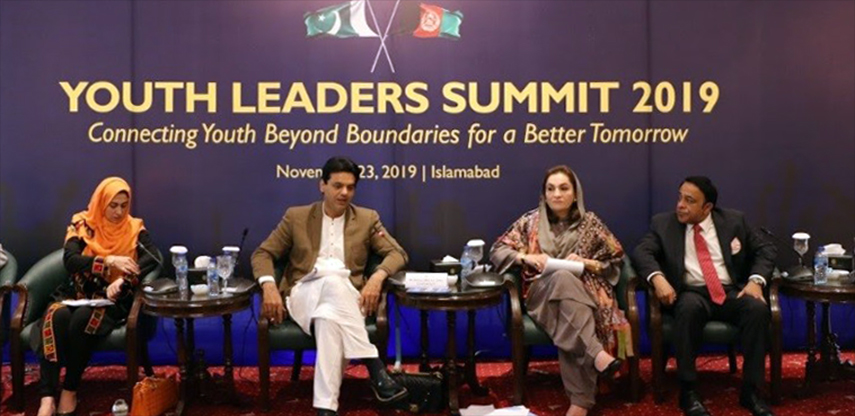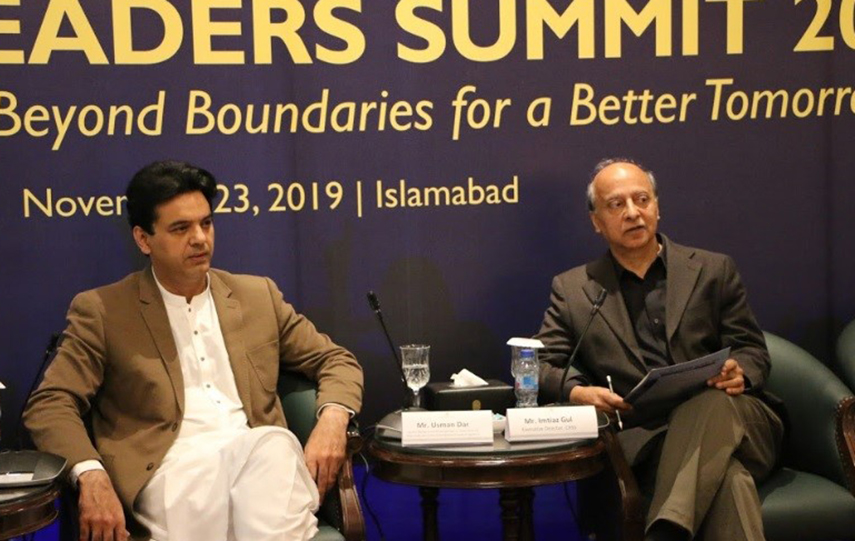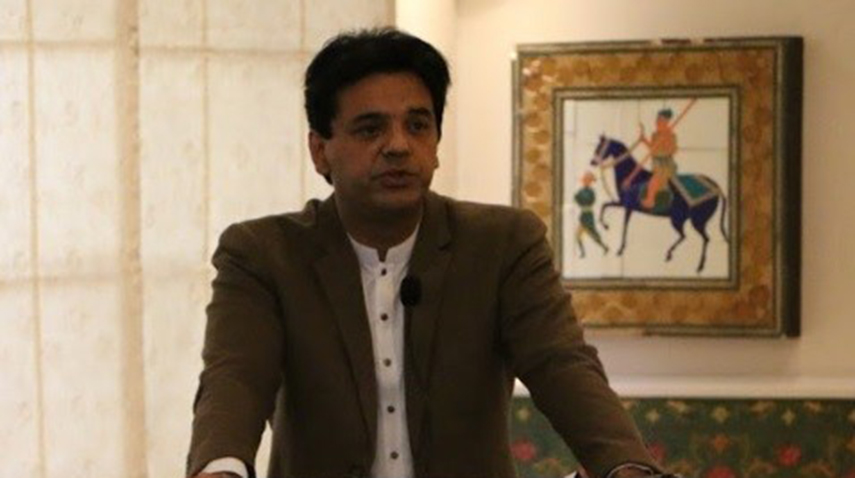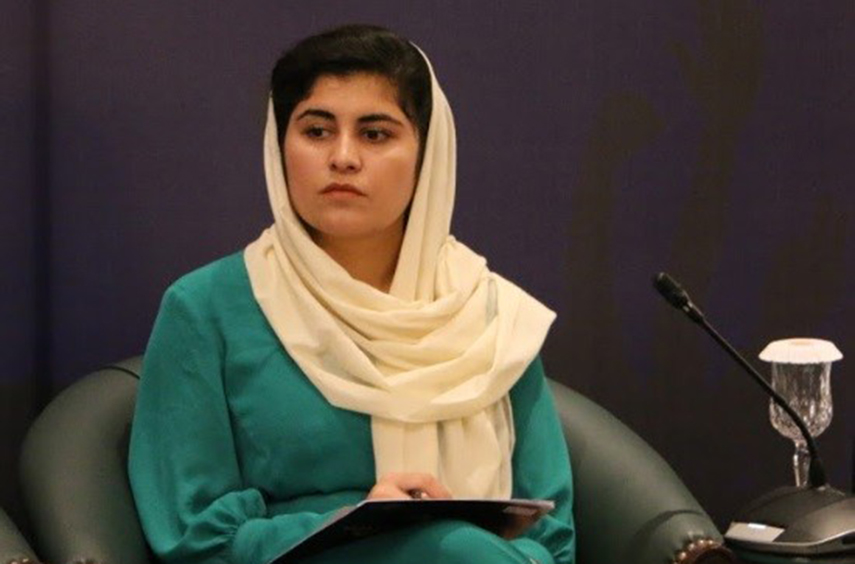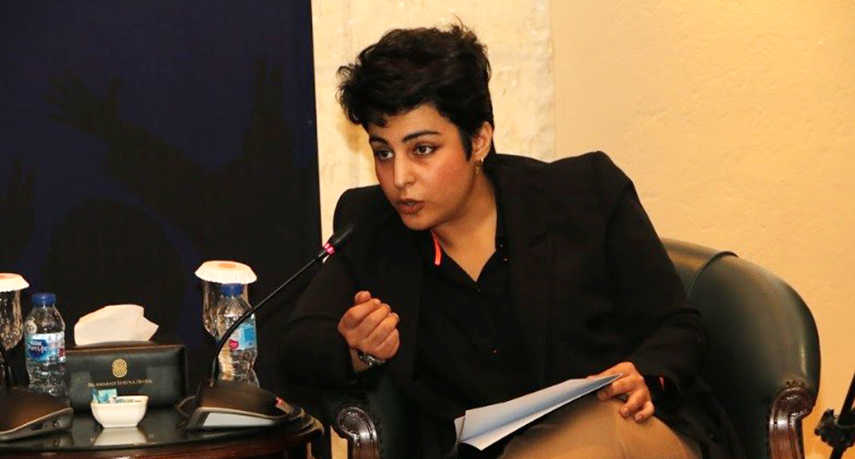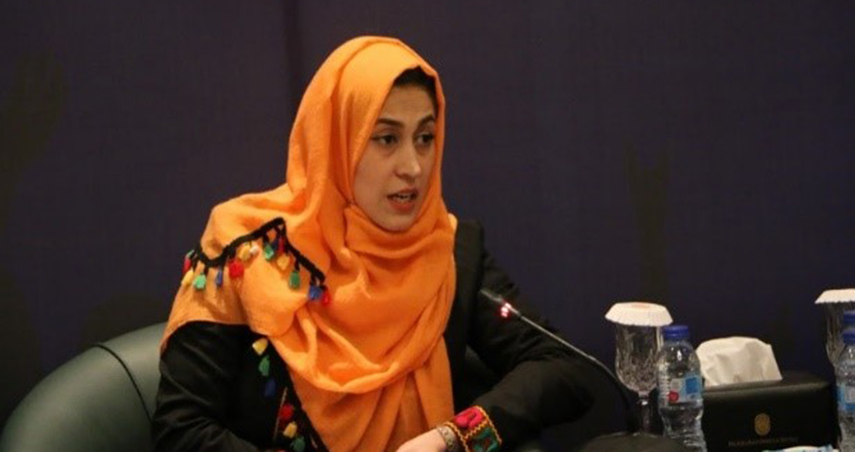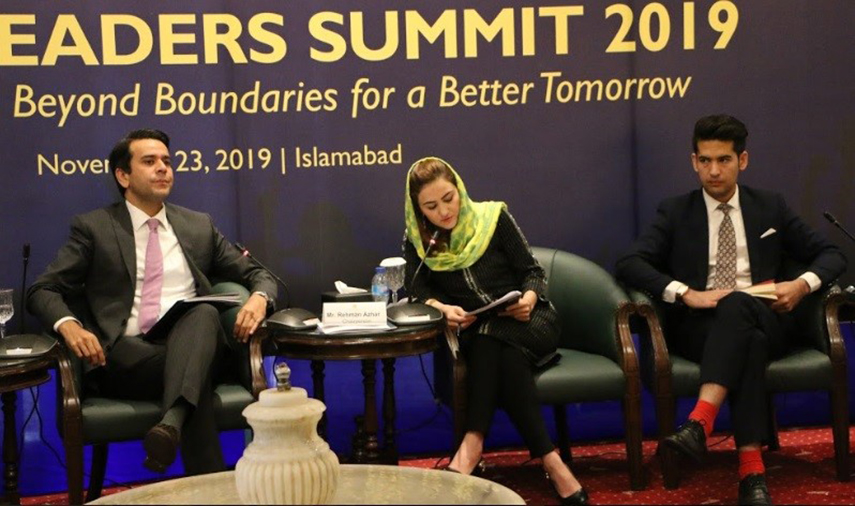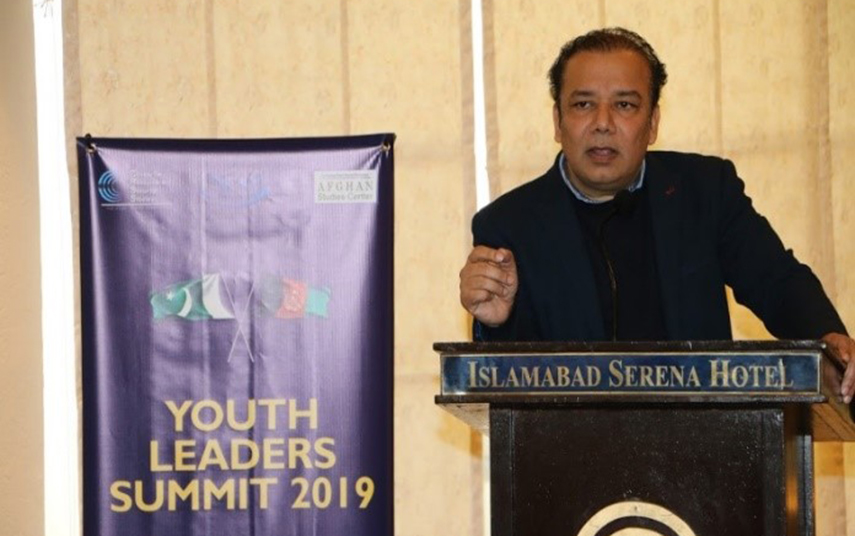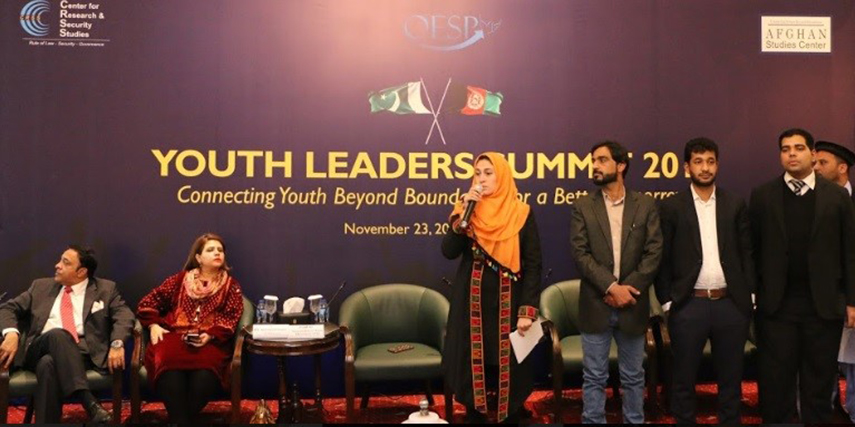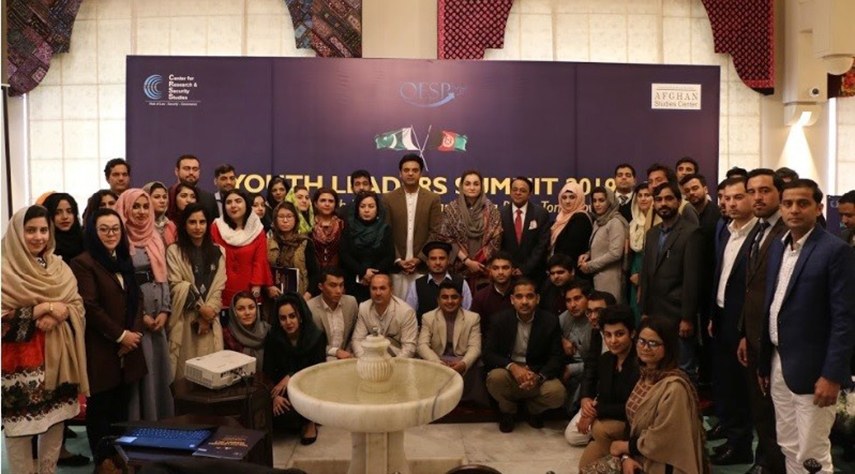The Center for Research and Security Studies (CRSS), as part of its efforts to improve people to people contact and promote positive and constructive narratives between Pakistan and Afghanistan, organized a Pak-Afghan Youth Leaders’ Summit, in collaboration with OESP, under its Track II project “Beyond Boundaries”, at Serena Hotel, Islamabad, on Saturday, November 23, 2019, with over 50 youth leaders in the fields of politics, social development sector, private and government sector, media, entrepreneurs, artists, musicians, writers, painters, graphic designers and filmmakers, from Afghanistan and Pakistan. The theme of the summit was: “Connecting Youth Beyond Boundaries for a Better Tomorrow” (The list and profiles of Afghan and Pakistani Youth Leaders attached in tab below).
The summit was divided into three sessions, from 10:30 am to 4:00 pm. The three sessions included: 1) Role of young leaders in bridging the gap between the two nations; 2) Building on commonalities and fusion of art, culture and media; 3) Brainstorming and recommendations. Session one was further divided in three sub-themes which included: a) Education – a connector for peace; b) The present and future of Afghan refugees; and 3) Trade – a catalyst in improving Pak-Afghan relations. Session two was also divided in three sub-themes i.e. a) Gender equality – a must for progressive furture; b) Building on commonalities: fusion of arts and culture; and c) How media can play a constructive role in Pak-Afghan relations.
The speakers for the main and sub themes of the first and second sessions from Pakistan’s youth leaders group included Aleena Khan Program Analyst at United States Institute for Peace (USIP), Shahaan Shah Independent Filmaker, Haroon Afridi Young Parliamentary Associate in Khyber Pakhtunkhwa Assembly, Wardah Iftikhar consultant Social Policy Section at UNICEF Pakistan, Akber Ali Pakistan National Council of Arts (PNCA) Karachi, and Ahsan Hamid Durrani Social Sector Development Professional.
While, the for the first and second session themes and sub themes speakers from Afghan youth leaders group included Suraya Azizi Vice President of the Student Government Association (SGA), Safia Ibrahimkhel Refugee Youth Representative from Pakistan at United Nations High Commission for Refugees (UNHCR) Global Youth Advisory Council (GYAC), Hosai Sarwari Gender Responsive Budgeting Officer at Ministry of Public Health, Afghanistan, Kahkashan Koofi Afghan Movement Institute Ministry of Economy Afghanistan, Abdul Maroof Modaqiq Graphic Designer and co-founder of Strategic Design Inc., and Marzia Rahimi Member Youth Parliament of Afghanistan were
The chief guest and the keynote speaker was Special Adviser to Prime Minister on Youth Affairs Usman Dar. While the chairpersons for the three sessions were Mehnaz Akber Aziz (MNA and Development Professional), Rehman Azhar (Senior Journalist and Anchorperson) and Ammara Durrani (Public Policy, Human Security and Sustainable Development Expert).
Imtiaz Gul, Executive Director CRSS, welcomed the participants and introduced “Beyond Boundaries” initiative to participants. He urged youth to process all information they receive critically. “This is the age of fake news. Only solution to combat fake news is to critically analyse any information you receive before making any judgment or sharing it.”
In the inaugural session, Usman Dar, speaking to the participants of the Pak-Afghan Youth Leaders’ Summit 2019, stated that Pakistan’s current government is committed to trust-based friendly bilateral relations with Afghanistan and is working to utilize every possible channel to improve bilateral ties.
“It is so heartening to see young leaders from both the countries, sitting together side by side under a single roof,” Dar said of the gathering organized by the Center for Research and Security Studies (CRSS) and the Afghan Studies Center as part of its cross-border Track 1.5/II initiative. “This meeting of young leaders gives us hope, even in the often politically charged up environment,” he said, adding “the world we live in today is far better than it was thirty years ago.” “The credit goes to youngster like Steve Jobs and Mark Zuckerberg; they changed the face of the earth. We want the same from the youth of Pakistan and Afghanistan. Both need to invest in human capital. This is where Pakistan and Afghanistan need to work together to carve out a bright future for the next generation,” he said.
Usman Dar also gave good news to the Afghan youth present at the summit, saying that he will personally request and ask Chairman Higher Education Commission (HEC) of Pakistan to increase the number of scholarships for Afghans.
Mehnaz Akber Aziz, who chaired the first session, speaking on the occasion, was of the view that if Pakistan and Afghanistan have to grow in an inclusive manner, they will have to prioritize and invest equitably in young people. as the economic potential of the country can only be unleashed by embracing its young population as its most valued resource for sustained growth. With over 64% of the total population below the age of 30, Pakistan is currently one of the youngest countries in the world, where as 63% of Afghanistan’s 27.5 million people are under the age of 25. We have to make an effort to turn them into a demographic dividend, added Mehnaz.
She also suggested education diplomacy between Kabul and Islamabad, as it is the one of the contemporary approaches which can play an effective role in bringing the two nations closer in a constructive way.
Suraya Azizi, Afghan speaker, quoted Confucius, “Education breeds confidence and confidence breeds hope. Hope breeds peace”. This tells how education is linked with peace. Education can also serve as a bridge between Pakistan and Afghanistan; particularly it can play a key role in imitating a meaningful conversation or a constructive dialogue between the youth across the border, as equal human beings without any bias. She proposed the inclusion of peace studies as a subject in the curricula across the globe. It would be a perfect forward moving step. “I have lived in Pakistan for nine years before we shifted back to Afghanistan. My sister studies here. I always feel like home when I am here,” she said adding that differences on both sides are created by politicians and media that can be bridged by knowing and understanding each other.
Speaking on education Pakistani speaker Aleena Khan, asked a thought-provoking question from the audience as how is education a pre-requisite for peace? She then went on to explain that a discussion on peace is not possible without delving into what drives conflict in the first place. Structural causes of political, economic and social inequality directly and indirectly lead to violent conflict. If these structural causes of inequality are addressed by making the state and society politically, socially and economically inclusive, the incentive for violent conflict will decrease leading to sustainable peace.
Now coming to Pakistan and Afghanistan, how is the role of education in addressing drivers of conflict relevant to Pakistan and Afghanistan? Education can channel discontent into non-violent civil movements. Studies from 106 states show that groups with higher education are less likely to engage in violent protests. Education can reduce crime and violence against children and youth.
Haroon Afridi, Pakistani speaker, speaking on trade as a catalyst in improving Pak-Afghan relations stated that Pakistan is one of the biggest trade partners of Afghanistan. Trade volume between the two sides from 2011 to 2018 was USD 2.4 billion per year; though, unfortunately it shrunk to USD 1.3 billion in 2019, due to politically charged up atmosphere every now and then. Now, what Pakistan and Afghanistan can get from trading with each other? Pakistan is growing and is in need of energy resources. So, Pakistan can get access to energy rich Central Asian states through Afghanistan. On the other hand, Afghanistan can benefit from China Pakistan Economic Corridor (CPEC) and use Pakistani sea ports more robustly.
Another Afghan speaker Safia Ibrahimkhel said that the engagement of youth in peacebuilding in a wider perspective can be ensured through the arts, culture, tourism, sports and education. The innovation and creativeness of young people in those areas could be mobilized effectively by connecting them with wider peacebuilding objectives, such as building bridges between divided communities and ensuring a viable process of reconciliation.
Endorsing Safia’s view point, Pakistani speaker Shahaan Shah showed a short documentary named as “Be Zai” (a Pashto word for displaced/lost) showing the adverse situation of Afghan refugees living in the rural and remote areas of Pakistan. He left the video to the audience for further interpretation.
Rehman Azhar, who chaired the second session, while building on the earlier perspectives to bridge the gap between two countries, proposed fusion of arts, culture, music and literature. He was of the opinion that arts and culture transcend boundaries; it helps make people understand each other. Regarding media Rehman Azhar was happy to share with the audience that youth of both the countries are very smart. Though, media may be playing a negative role and instigates blame game, but youngsters don’t trust media anymore. “We shouldn’t be avoiding the difference; we should be having a dialogue and resolve our difference in a decent way”, Rehman stated.
Highlighting the significance of fusion of arts and culture in bridging the gaps between the nations, Afghan speaker Abdul Maroof, while commenting on the prospects of arts and culture as a way forward for both sides to build on commonalities, said that these are unexplored domains in Pak-Afghan relations; it would make us understand each other in a better and effective way. “As a graphic designer, I would say let us design a better world to live in. He also recommended joining hands in the field on Information Technology (IT) to make it a common ground for advancing peace in the region. “This generation doesn’t want war and conflict. We want peace. We want to work on commonalities and connect people through art, culture, sports and literature,” added Maroof.
Pakistani speaker Warda Iftikhar urged for more such dialogues among youth across the border and expressed hope that such debates would help breaking stereotyping around the issues related to bilateral relations.
Afghan speaker Kahkashan Koofi shared with the participants that “gender equality means that men and women have the same rights and duties, and all have equal opportunities in society. Gender equality is also about justice and the sharing of responsibilities”.
Amir Ghouri, the Editor ‘The News’, in his remarks stressed to focus on situation of people surviving wars. “We discuss war and countries but it is actually the people that we need to discuss. Wars end and countries go on but people keep suffering and their lives are destroyed.” He said that people living in this region are the victims of nation state system. He recommended focusing on areas that don’t have any boundaries such as sports, art, music, entertainment.
In third session on brainstorming and recommendations, chaired by Ammara Durrani, leaders from both the countries were split into four groups: Education and Vocational Training; Trade, Economic Opportunities and Jobs; Media and Creative Arts; and Mainstreaming Gender, Refugees, Minorities and Environment, to come up with five Recommendations from each group. Ammara Durrani apprised the participants that a lot of times young people feel frustrated that their voices are not heard. Secondly, that there are not enough avenues and platform available to them so they could do practical work. “This session is going to be your opportunity to come up with practical solutions in areas that we have been discussing for years”, she added.
After a very inclusive, positive, and interactive discussions by the speakers and chairs followed by Question & Answer sessions during the three sessions, the youth leaders of both countries from the four groups unanimously drafted the joint policy recommendations on the four themes. (Joint Policy Recommendations attached in tab below)
The summit ended with a cultural night and dinner organized at La Montana, Islamabad. The objective was to informal interactions and foster friendships between the two youth leaders’ groups, to encourage future engagement and possible linkages. Helaa Band from Quaid-i-Azam University (QAU) performed with great energy and made everyone dance to the tunes of Rabab. The band performed in three languages i.e. Urdu, Pashto and Darri. The beautiful evening came to an end amid swirls of Attan (the traditional Afghan/Pashtoon dance) after a scrumptious meal with a splendid view of Islamabad from the top of Margalla Hills.

